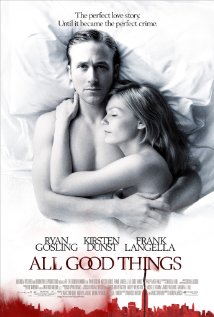“All Good Things” tells the story of David Marks (played by Ryan Gosling), son of highly successful real estate mogul Sanford Marks, and his wife Katie (Kirsten Dunst). Set in the 1970s, this romantic crime thriller is based on a real story, the life and times of one Robert Durst, who was tried and acquitted of the charges from the mysterious disappearance of his wife (which is still considered a missing persons case) and the murder of his long time friend who was shot execution-style.
The film is shot and plays out like any old ordinary crime thriller, as mystery and intrigue slowly develop and rise into even more mysterious and intriguing climaxes. The only difference this time around is this crime thriller is actually mysterious and intriguing. This marks a stunning performance for Gosling, who begins as a sweet, heartfelt young man attempting to break free from his father’s brooding grasp and morally suspect business into the arms of beautiful Dunst. Dunst’s own transformation from lovely small town girl to trophy wife and finally to abused victim is quite gripping. I am no fan of Dunst, so to find myself invested in her well-being was a surprising change of pace for her acting career.
Easily one of greatest things this film does is make every character sympathetic at some point in time; those who are heartwarming victims of circumstance transform into new American Psychos, antagonistic fathers who force their sons into the family business suddenly become victims in their own right, even the supporting cast has their own surprisingly rich personalities. Katie’s brother, who we see barely three times throughout the film, breaks down into tears after her disappearance, and we feel for him.
The one complaint I have about this film is how clear the filmmaker’s opinions are of the actual trial and acquittal of Robert Durst, who is still alive today, living and working in Florida. The opening and epilogue of the film were quite harsh against this man because there is the possibility (however slight) that he was not involved in his wife’s mysterious disappearance and the sequence of deaths that followed.
The film left no room for questioning. There is a scene in the movie that implies that Durst killed his and his wife’s dog and buried it somewhere on their property. Later in the film when the district attorney picks up the case again and searches his property, the only evidence found was the skeleton of a dog. It can be assumed that the actual investigation did find these remains; however, I seriously question whether we have any evidence to support he actually did kill the dog.
Removing the real aspect from the film brings it into a new dimension of crime dramas, a surprisingly riveting and intriguing plot that snowballs and paints a unique villain with an equally unique set of victims. A sometimes overly brooding soundtrack accompanies some very powerful single shots throughout, marking this a solid thriller with a very surprising amount of strong acting.

